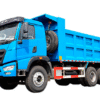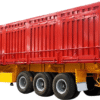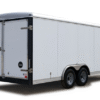If you’re planning a construction project, one of the first questions you’ll ask is, How much does a 10-yard truck of concrete cost?” The answer isn’t always straightforward—prices vary based on location, mix type, and delivery fees. In this guide, I’ll break down the key factors that affect pricing so you can budget accurately.
From my experience, most suppliers charge between $1,100 and $1,500 for a full 10-yard load of standard ready-mix concrete. However, specialty mixes (like high-strength or fiber-reinforced concrete) can push costs closer to $1,800 or more. Delivery distance, fuel surcharges, and seasonal demand also play a big role—so it’s best to get local quotes before committing.
Wondering if a 10-yard load is right for your project? Smaller jobs might only need partial loads (sold by the cubic yard), while large foundations or slabs often require multiple trucks. I’ll also share tips on calculating how much concrete you actually need—so you don’t overpay or fall short. Let’s dive in!
Cost Overview
I find it’s important to grasp all the cost parts when you budget for a 10-yard concrete Truck. I’ve seen the average cost for a 10-yard truck of concrete range from $1,169 to $1,444. This price often includes delivery if you’re within 20 miles of the mixing site. From my experience, this amount works well for projects like a 20×24 driveway.
Price Per Cubic Yard
- Full truckload price (10 yards): $119–$147 per cubic yard
- Short load price (less than 10 yards): About $172 per cubic yard
I’ve noticed the price per cubic yard is higher for smaller amounts. This happens because of short load fees.
Additional Cost Factors
| Cost Factor | Price Range |
|---|---|
| Additional yard (beyond 10) | +$60 per yard |
| Saturday delivery | +$8 |
| Coloring | +$31 to $170 |
| Stamped finish | +$45 to $108 |
| Short load fee | ~$40 per cubic yard |
If your project uses less than 10 yards, I estimate you’ll pay $150 to $205 per cubic yard. This price includes the short load fee. I’ve also seen some suppliers charge a flat short load fee. This fee can be $100 to $300. It often depends on the supplier and where your project is.
Per Square Foot Costs
From what I’ve seen with home concrete projects, poured and finished concrete often costs about $5 to $10 per square foot.
- Average price nationwide: $125 per cubic yard
- Typical company range: $110–$165 per cubic yard
I find that knowing these details helps you make a good budget estimate for a 10-yard concrete truck.
Base Price Breakdown
Let’s break down the base price. For a 10-yard concrete truck, I see the price often ranges from $1,560 to $2,600. This works out to $156 to $260 per cubic yard. From my experience, this price includes the concrete mix. It also covers standard delivery if you’re in the local area.
Concrete Type Pricing
I find that different concrete types have different prices:
- Standard Concrete: $120 – $144 per cubic yard
- High-Strength Concrete: $180 – $204 per cubic yard
- Specialty Concrete: $240+ per cubic yard
Delivery Costs
- Delivery fees make a big difference in your base price. I’ve observed these ranges:
- Local delivery: $72 – $120
Long-distance delivery: $120 – $240
Small Order Surcharges
If your project needs less than a full 10-yard truck, you might face extra charges. For instance, I’ve seen a short load fee. This is about $40 per cubic yard for orders under 10 yards.
Typical Total Price Ranges by Order Size
| Cubic Yards Ordered | Price Range (Concrete + Short Load Fee) |
|---|---|
| 1 | $150 – $205 |
| 2 | $300 – $410 |
| 3 | $450 – $615 |
| 5 | $750 – $1,025 |
| 10 | $1,110 – $1,650 |
| 15 | $1,650 – $2,475 |
| 20 | $2,200 – $3,300 |
| 30 | $3,300 – $4,950 |
Expert Opinion:
“Based on my 25+ years in construction management, the pricing for concrete delivery matches my experience. I find one key thing people often miss is how the concrete mix details affect a project’s success. The base price matters, of course. But I always tell my clients to choose the right concrete strength and any needed additives for their specific job. Don’t just pick the lowest price. For example, a driveway in an area with freezing and thawing cycles needs different concrete features than a foundation in a milder climate. Timing is truly vital with concrete. I’ve seen too many projects suffer due to bad planning for curing conditions. It’s good to know that suppliers set concrete prices to help their operations run smoothly. So, if you match what your project needs with how they work, you’ll usually get better prices and results.“
———— Michael Rodriguez , Professional Civil Engineer and Construction Cost Analyst with 25+ years of experience in commercial and residential concrete applications
Other Cost Elements
From my perspective, the total base price covers more than just the concrete. It also includes:
Materials: This means things like concrete, any additives, reinforcing steel, and the formwork. I find knowing these components helps in understanding the overall cost.- Labor,Equipment,Finishing
Material cost is often figured based on your slab’s square footage and thickness. Labor costs can change. Factors include your location, how complex the job is, and the skill of the workers. I’ve seen this vary quite a bit.
Extra Costs and Fees for a 10-Yard Concrete Truck
When I plan for a 10-yard truck of concrete, I always focus on the extra costs. These can increase the final bill fast. I’ve found these fees are often hard to avoid, so I think it’s best to factor them in from the start.
Common Additional Fees I’ve Encountered
Delivery Fees: Most suppliers I’ve worked with charge a flat delivery fee per truck. In my experience, this fee is around $285 per truck. In some regions, like the Philadelphia area, I’ve seen this go up to $330. I suggest confirming this for your area.Overtime/Wait Time: If unloading takes longer than the included hour (which I find is 1 hour per truck), you should expect to pay overtime charges. The common rate I’ve come across is $2.00 per minute after that first hour. I always try to be ready for a quick unload.Distance Surcharges: I’ve found that free delivery often covers a set area, perhaps 15 to 20 miles from the plant. Beyond this, suppliers I’ve dealt with might charge about $9.75 per mile. For example:
- If you’re located 35 miles away, and the free delivery radius is 15 miles, those extra 20 miles could add $195 to your delivery fee. I recommend checking this carefully.
Weekend and Holiday Delivery Fees: In my experience, if an I schedule concrete delivery for a weekend or holiday, it will cost more. I’ve seen this extra charge be around $8 per cubic yard on top of the regular rate.Short-Load Fees: For orders that don’t fill the truck (I find this is often for less than 10 yards), a “short-load” fee might apply. Instead of $119–$147 per yard for a full load, the price can increase to $172 per yard. I suggest trying to order full loads if practical.Material Surcharges: Do you need high-strength (high PSI) concrete? I’ve seen this cost up to 20% more than basic or fast-setting mixes. If you add extra reinforcement, like rebar, or choose specialty finishes, I expect those will make the price higher.
Example: How Fees Add Up
Suppose I order a 10-yard truck at $130 per yard. This makes the total base price $1,300. Here’s how fees can impact my total:
- Truck delivery fee: $285
- Saturday delivery: $8 x 10 yards = $80
- Extra mileage (10 miles over free zone): $9.75 x 10 = $97.50
My estimated total: $1,762.50
From my experience, this total doesn’t cover other possible surcharges. These could be for wait time, reinforcement, or premium concrete mixes. I always recommend reviewing the detailed quote. This helps me spot all possible extra costs before I commit.
Short Load vs. Full Truckload: Understanding Cost and Pricing
If you’re looking at short load versus full truckload concrete, I’ve found the total price and per-yard cost can be quite different. This difference really affects your budget.
What Is a Full Truckload?
In my experience, a full truckload means you order 10 cubic yards of concrete. This is what most Mixer Trucks hold. I recommend ordering a full truckload if you want the best price per cubic yard. Rates are often $119 to $147 per cubic yard. So, for 10 yards, you’ll likely pay between $1,100 and $1,500. This can change based on where you are and your supplier. For big projects, like commercial foundations or large driveways, I’ve seen that ordering several full truckloads can cut the cost per truck. Sometimes, it can be as low as $1,300 per truckload if you order in bulk.
What Is a Short Load?
A short load is any order for less than 10 cubic yards. I often see these for smaller jobs like patios, walkways, or shed foundations. While short loads are convenient, they do have extra costs. I find most suppliers add a short-load fee. This fee helps them cover the higher cost of smaller deliveries. This fee is often between $40 and $53 per cubic yard. Sometimes it’s a flat $50 to $110 for each delivery. Once you add these fees, I’ve noticed the price per cubic yard for a short load can go up to $150 to $205. Many orders under 10 yards average about $172 per cubic yard.
Example: Comparing Short Load and Full Truckload Prices
Full Truckload (10 yards):
- Total: $1,100 – $1,500
- Per yard: $119 – $147
Short Load (under 10 yards):
- Per yard: $150 – $205 (this includes the short-load fee)
- A common short-load fee I see is: $40 – $53 per yd or $50 – $110 flat per delivery
Short Load Cost Table
Here’s a table I find helpful for understanding short load costs:
| Cubic Yards Ordered | Total Price (Includes Short Load Fee) |
|---|---|
| 1 | $150 – $205 |
| 5 | $750 – $1,025 |
| 9 | $1,350 – $1,845 |
| 10 | $1,110 – $1,650 (no short load fee) |
My Key Takeaways
From what I’ve seen, short loads cost a lot more per yard. This is because suppliers add fees to cover their operating costs.In my opinion, full truckloads always give you better value per yard. This is really useful for larger jobs.I’ve learned that short-load fees are a standard part of pricing with most ready-mix concrete suppliers.Delivery fees, extra charges, and minimum order sizes can change depending on your area and who you buy from. Because of this, I always recommend you get detailed quotes.
If you can, I suggest ordering a full 10-yard truck. You’ll achieve good savings this way. Short loads give you more options for small projects. However, based on my experience, they have a much higher cost per cubic yard because of extra operational fees.
Cost by Project Size
For concrete delivery, I find that project size is the biggest factor for your final price. Suppliers set prices per cubic yard. They have different rates for full truckloads and smaller (short) loads.
Delivered Concrete Costs by Project Size
Let’s look at a standard 10-yard order. This amount fills a common concrete truck. Based on my experience, the delivered cost for this is $1,260 to $1,370 per truckload. So, for a full 10-yard delivery, I see this breaks down to about $126 to $137 per cubic yard.
If your project needs less than 10 yards, I notice you’ll pay more per cubic yard. Suppliers add short-load fees. I’ve seen these fees run $15 to $17 extra per yard. Here’s a breakdown of what I believe you can expect for different project sizes:
- 1 cubic yard: $140–$150
- 2 cubic yards: $270–$290
- 3 cubic yards: $400–$440
- 5 cubic yards: $680–$740
- 8 cubic yards: $1,100–$1,180
- 10 cubic yards: $1,260–$1,370
- 20 cubic yards: $2,510–$2,730
Impact of Project Size on Concrete Pricing
I find larger projects save you money. They fill the truck and skip extra fees. For instance, full 10-yard orders achieve the lowest per-yard price. On the other hand, I see small projects face higher rates per cubic yard. They also have minimum delivery charges.Let’s say your project needs 7 yards. You will face a higher per-yard price. You also might pay a short-load service fee. I’ve observed this fee is often between $60 and $110. This is an additional cost to the higher rate.
Alternatively, for projects needing over 10 yards, like 20 or 30 yards: suppliers deliver these as multiple full truckloads. I note the per-yard price in these situations remains near the base rate. I recommend this for larger pours as it offers the best value.
My Key Takeaways:
I believe project size impacts the price per cubic yard. I see that short loads (less than 10 yards) mean higher per-yard costs and extra fees.From my experience, full truckloads (10 yards) offer the best per-yard economy for both homeowners and contractors.
What Affects the Cost of a 10-Yard Concrete Truck?
If you’re planning to buy a 10-yard truck of concrete, I’ve found that a few key things affect the final price. Knowing these will help you guess and manage your project budget better, in my opinion.
How Material Quality and Mix Design Change the Price
The type of gravel or crushed stone in your concrete mix is a big deal for the price. I’ve noticed that if your project needs strong concrete, special mixes, or certain chemicals like Water reducers or accelerators, the cost goes up. From my experience, if you ask for custom mixes or top-quality materials, you’ll pay more per yard.
Delivery Distance and Getting It to You
How far the concrete plant is from your job site really matters. I find that longer trips mean you pay more for transport. This is particularly true if your site is a long way from the main concrete suppliers. Things like fuel costs, how easy it is to get to your site, and if you need special trucks (maybe with advanced mixing) can change the delivery fee.
Labor Costs and What’s Happening Locally
Labor costs can also change your total. Based on my experience, in places where there’s a lot of building going on or not much concrete available, both worker wages and material prices often go up. I suggest planning for extra labor charges if you need delivery outside normal hours or at very specific times.
How Much You Order and Short Load Charges
The amount of concrete you order affects your per-yard cost. I recommend getting a full 10-yard truckload if you can; it’s usually the cheapest, costing around $119–$147 per yard. That makes the total $1,190 to $1,470. If you get less than a full truck, you’ll see ‘short load’ fees. These fees make the per-yard price jump up fast, sometimes to $172 or even more. This happens because suppliers have to cover their truck running costs, no matter how much concrete is inside.
Getting to Your Site and Extra Delivery Charges
If your site is hard to get to, it takes more labor time. You might also need special trucks, which means a higher bill. From what I’ve seen, if the truck has a long drive or runs into things blocking the way, you should count on higher delivery fees overall.
Rules and Environmental Needs
Sometimes, local or state environmental rules can add to the cost. For example, rules might say suppliers have to use low-emission trucks or recycle Water. These things make it more expensive for them to operate, and I find they usually pass those costs on to you in the price.
Supplier’s Name, Truck Size, and Tech
Suppliers with a good reputation, bigger trucks, or fancy delivery and mix tech might charge a bit more. But, in my experience, these things can sometimes make the job go smoother and save you money if you have a big or complicated project.
Quick Look at Main Cost Factors:
Quality of materials and type of mix,Chemical additives, How far to deliver, site details, and ease of access (I believe these are often overlooked), How much you order (a full truck vs. paying extra for small loads), Local labor prices and how much concrete is needed, Costs for environment and rules, Supplier’s standing and truck capabilities (I’d check these carefully)
Example of Concrete Prices:
If you order a full 10-yard truck, I usually see the cost stay between $1,190 and $1,470. Choosing a smaller load often means your per-yard cost can go up to $172 or more because of those significant short load fees I mentioned.
So, to sum it up, the price for your 10-yard concrete truck really comes down to a mix of things. I always tell people to consider the material quality, how it gets to you, labor and local market trends, your site’s details, any local rules, and who your supplier is.
Planning for Your 10-Yard Concrete Truck
If you’re getting concrete delivered, I find that good planning helps you avoid extra costs and delays. Here are the main things I always consider for a 10-yard truck:
Site Access and How We’ll Deliver
First, I suggest you check if a large concrete truck can easily reach your job site.I also recommend verifying the roads. Can they support a heavy truck? Keep in mind, a truck carrying 10 cubic yards of concrete can weigh over 40,000 pounds.Is your site cramped? Does it have tight driveways, low-hanging trees, or other blockages? From my experience, a full-size truck might not fit in such situations.If that’s the case, you might need to get smaller trucks. Or, be prepared to pay extra for labor to wheelbarrow or pump the concrete.
Local Rules and Weight Limits
I always emphasize that concrete trucks must follow state and local weight limits.For instance, I know some places don’t allow trucks over a certain weight on smaller roads, particularly during specific seasons.This situation can result in partial loads. These often cost more per cubic yard. So, I strongly advise checking your local regulations before you order.
Figuring Out How Much Concrete You Need
I always suggest measuring your project area with precision: Length (ft) × Width (ft) × Depth (inches or ft). Then, divide this by 27 to find the cubic yards.My advice is to order a bit more to prevent shortages—I usually aim for about 10% over the calculated amount. Running short can add to your expenses and cause project delays.I think it’s smart to ask your supplier about their minimum order size. Also, check if “short load” fees are added for anything less than a full truckload.
Timing Your Pour
From my experience, concrete delivery windows are often quite strict. You generally have about one hour to unload the truck. Taking longer can mean overtime fees, which I’ve seen at around $2 per extra minute.My tip is to coordinate your site preparation and your crew’s arrival with the truck’s delivery time. This way, you won’t pay for making the truck wait.
Weather and Pouring Conditions
I know that temperature and weather significantly influence how concrete sets.On very hot or cold days, I suggest you talk to your supplier about using additives. Things like retarders or accelerators can be useful, but they might add to your overall cost.
Picking the Right Concrete Mix
I believe it’s vital to ask for the correct concrete mix for your specific project. If you choose standard, high-strength, or specialty mixes, this will affect the cost. It can also change the truck’s actual carrying capacity.In my experience, denser mixes or those with extra additives can reduce the amount a truck is permitted to haul. This is because of legal maximum weight limits.
Standard Mixes vs. Special Orders
Standard ready-mix trucks often hold 10 cubic yards. However, from my observations, difficult site access, weight restrictions, or your project’s location can mean you’ll need smaller delivery amounts.If you require concrete that is colored, stamped, or reinforced with fiber, I’d anticipate a higher price. These special options generally increase the total cost and, in some cases, the production time.
To sum up: I recommend you review site access, local rules, the volume needed, timing, weather, the mix type, and any extra requirements with attention. I strongly suggest you double-check all these planning details with your concrete supplier before you order your 10-yard truck. From my perspective, this planning will help you avoid surprise charges and delays, and you’ll be more likely to stay on budget.
summary
As I finish this guide on concrete costs, from my experience, knowledge is your best tool for budgeting. I suggest getting quotes from several local suppliers. This often gives you a better price than relying on national averages. Based on my experience, careful planning can save you hundreds of dollars. I recommend you measure your area well. You should also think about all possible fees. Preparing your site correctly is also key. It doesn’t matter if your project is a small patio or a large foundation. When you understand these pricing factors, you gain control over your project. I believe proper preparation helps you avoid unexpected costs. This way, you get the best value for your money when you invest in concrete.
FAQS
1. How much concrete is in a 10-yard truck?
A 10-yard truck carries approximately 13-14 tons of concrete (varies slightly by mix design), which can pour about 400 square feet at 4 inches thick. For a typical residential foundation, 1-2 truckloads are usually sufficient.
2. How is delivery pricing calculated?
Delivery fees typically include:
-
Base hauling charge ($100-$300, depending on distance)
-
Waiting time fee (if unloading exceeds free period, ~$30-$80/hour)
-
Remote area surcharge
Pro tip: Always check the supplier’s free delivery radius (usually 15-20 miles).
3. Why do different concrete grades vary so much in price?
Key pricing factors:
-
Material costs (Standard 3,000 PSI mix ~$1,100/truck; 5,000 PSI high-strength may reach $1,800)
-
Special admixtures (Fiber reinforcement, accelerators, etc. add 15-30%)
-
Seasonal demand (Prices spike 10-20% during peak construction months)
4. Can I order just half a truck (5 yards)?
Yes, but expect higher per-yard costs (e.g., $1,100 for 10 yards vs. $800 for 5 yards). Some suppliers charge “short load fees.” For projects under 8 yards, compare full/partial load economics.
5. What if the concrete sets too fast/slow?
-
Fast setting: Request retarder additives ($50-$100 extra)
-
Slow setting: Avoid midday pours or specify accelerated mixes
-
Emergency: Call your supplier immediately – NEVER add water onsite!





